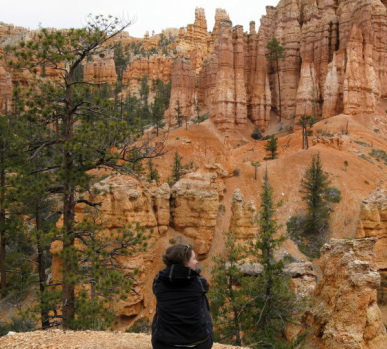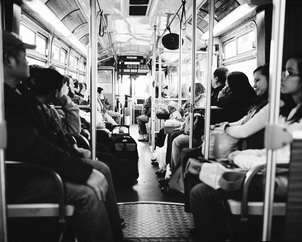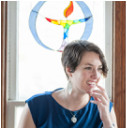Theology
Unitarian Universalism is a theologically diverse tradition, where people of many beliefs come together around shared values and a common set of commitments. Ministry within our faith tradition requires theological flexibility and a willingness to use multiple languages of meaning in order to speak to our diverse congregants and a yearning world. I am profoundly called to this ministry, and delight at the challenge of ministering to our diversity.
As a life-long Unitarian Universalist, honoring theological diversity is central to my understanding of religious leadership; I know no way to minister besides ministering to diversity. This takes the shape of naming that which is most meaningful, or the holy, in many ways, drawing on a variety of theologies and philosophies in my preaching and leadership style, and offering music, scripture, and reflections that touch on the many ways my congregants make meaning in their lives.
All of that said, I am grounded in, and sustained by my own theology; the context in which I make meaning, and through which I am called into our ministry. Below, I describe my theology.
In faith, Rev. Abbey

There is a sacred unity to all; a oneness that constitutes the universe and flows through each of us. Our very substance is constantly being renewed and exchanged with the substance of the world around us. As we breathe in, we take in oxygen molecules that have circulated through the rocks, water, and life of earth for billions of years. As we breathe out, we return molecules to this ever-flowing stream of matter. With each breath, each peal of laughter, each tear, we are changed at a molecular level. In each moment, we are connected to the world around us through the give and take of the substance of our being.
This oneness – this unity – is that which I call God. God is the sound and the silence, the matter and the void, the broken and the healing, the dark and the light, the tragic and the triumphant. God is everything – the whole – and though I do not know whether God is conscious, or has a will, because God is the whole, and we are constantly, inescapably, moving in interdependent relationship with all that is, God is also the unending draw towards wholeness.
Yet, so much of the human experience is an experience of division. It is easier to see myself as a distinct being than a flow of interdependence – easier to understand myself as the rock than the river. But the unity of interdependence does not mean ‘sameness.’ Much of life’s beauty is found in uniqueness, in difference, and in contrast - the orange of the setting sun is more vibrant when cutting through an indigo sky; wading into the cool of a lake is more refreshing with the hot sun beating down on our shoulders. In unity, one knows wholeness; in unity, one no longer feels alone; and yet, it is in diversity – in contrast – that one feels the stunning vibrancy of existence. The wholeness of existence is God, and in the diversity of existence, God comes to know God’s self.
This oneness – this unity – is that which I call God. God is the sound and the silence, the matter and the void, the broken and the healing, the dark and the light, the tragic and the triumphant. God is everything – the whole – and though I do not know whether God is conscious, or has a will, because God is the whole, and we are constantly, inescapably, moving in interdependent relationship with all that is, God is also the unending draw towards wholeness.
Yet, so much of the human experience is an experience of division. It is easier to see myself as a distinct being than a flow of interdependence – easier to understand myself as the rock than the river. But the unity of interdependence does not mean ‘sameness.’ Much of life’s beauty is found in uniqueness, in difference, and in contrast - the orange of the setting sun is more vibrant when cutting through an indigo sky; wading into the cool of a lake is more refreshing with the hot sun beating down on our shoulders. In unity, one knows wholeness; in unity, one no longer feels alone; and yet, it is in diversity – in contrast – that one feels the stunning vibrancy of existence. The wholeness of existence is God, and in the diversity of existence, God comes to know God’s self.

Rev. Dr. Forrest Church wrote “Unitarianism proclaims that we spring from a common source; Universalism, that we share a common destiny.”[1] As a Unitarian Universalist, I lift up the “oneness” and “interdependence” of life as both source and destiny. Humanists might describe our lives as a creative experiment in borrowed matter and energy. UU youth might sing “We come from the Goddess, and to her we shall return like a drop of rain flowing to the ocean.” The Hebrew Scriptures say “you are dust, and to dust you shall return.”[2]
Process Theology understands existence as an infinite cascade of events, where each moment has been influenced by all moments that came and went before it. God is what holds the memory of all that has come before and is now gone, and God is also the holder of all future possibilities. God is the constantly moving holder of both halves of infinity. God is both the source of existence, and its destiny. One Source, One Destiny.
One Source: One Destiny describes our physical existence, yet it serves as a metaphor for right relationship in the world as well. Facing into our unity – truly knowing that we are all interconnected – calls us to ethical action. As Rev. Dr. Martin Luther King, Jr. famously wrote in his letter from a Birmingham Jail, “Injustice anywhere is a threat to justice everywhere. We are caught in an inescapable network of mutuality, tied in a single garment of destiny. Whatever affects one directly, affects all indirectly.”
Though there is beauty, and joy, and goodness in the world, there is also brokenness, separation, and evil. Evil is that which narrows our viewpoint so we only see a small part of the picture. Evil is a rejection of the inescapable network of mutuality; it is the narrow-mindedness that spurs retaliation for harm and perpetuates the cycle of brokenness. Good is that which widens, opening our hearts, minds, and spirits to connection with others, connection to the big picture.
God is in human actions that are both Good and Evil – both wide and narrow - but because the wholeness of God holds both, all is ultimately drawn towards that expansive wholeness. In other words, God is in the unbroken skin, and God is in the knife. We may experience the pain of a cut, but ultimately, God as wholeness is like the body’s constant process of self-healing throughout the pain of each of life’s wounds.
The world can be a cruel place. Each day the news tells of fresh acts of violence, rape, abuse, and breaches of integrity. Many of us are haunted by experiences of violence or cruelty in our own lives – whether we were victim, perpetrator, or both. The suffering we feel in the death of a loved one is excruciating enough if the loved one dies by accident, yet it is made infinitely harder if the death came about through the willful violence of another. How can we reconcile the human capacity for monstrous cruelty with our capacity for transcendent compassion and love? How can we love again when the suffering of lost love seems almost to destroy us?
If we live long enough, each of us will face these questions. We cannot choose to avoid heartbreak in life. But when our hearts break, we can choose to be broken down, to be defeated, or we can choose to be broken open,[3] to be transformed.
I take heart in this: humans seem hardwired to reach out to each other. I once shared a bus ride with a very unkind man. Immediately after sitting down next to me, he began berating the overweight people on the bus. Then he moved on to women, people of color, his own family. Every word he said was degrading; denying a human’s inherent worth and dignity, denying the value of love in his life or anyone else’s life. Though I argued with him at every turn, and tried to end the conversation, he kept talking. When I finally got off the bus, I thought “if ever there is someone to challenge my belief that humans are basically good and loving, it is him.”
As I walked through the evening’s gently falling snow, I realized that he chose to sit down next to me. He began the conversation. And he was the one who kept it going for over half and hour. No matter what he said about connections with other people being expendable, his behavior told me that he sought connection with another.
Even the most wounded of us seek connection, seek relationship. And relationships lead us towards loving transformation. As the substance of our being circulates through the air with every breath, our souls are also changed with each interaction. Not every short conversation leaves a memorable impact, but I find hope in the fact that some of them do; and the more we reach out, the more we experience transformation. No matter how closed off, how unkind, how rigid a person is, in our connections with others, there is hope for all of us to transform, and to be transformed.
This loving transformation engendered by human connection is our salvation. In coming to know one another, and seeing ourselves in each other, we find a love that opens us to greater wholeness. This does not mean we should maintain connection to those who harm us; quite the contrary, in cases of abuse, the healing of both the abused and the abuser often can only come about through the end of the relationship. If a relationship creates more wounding than healing, it is better for us to seek connection elsewhere. But even when individual relationships must end, our salvation depends upon constantly seeking new loving and supportive relationships.
It is for this love, this transformation, this salvation that we come together in religious community. Religious communities are spaces where individuals and families gather to cultivate love, to open their hearts further, experience the holy, support each other through difficulty, join together in resisting oppression and injustice, and strive to live lives of meaning.
We all arise from one infinite source, and our shared destiny it to return to that same source. In the time between, we are called to come to know the beauty of the world, make justice, and love each other.
[1] UU World Article “Universalism: A theology for the 21st century,” Forrest Church, November/December 2001.
[2] Genesis 3:19, New Revised Standard Version.
[3] Broken Open: How Difficult Times can Help Us Grow, Elizabeth Lesser, 2005.
Process Theology understands existence as an infinite cascade of events, where each moment has been influenced by all moments that came and went before it. God is what holds the memory of all that has come before and is now gone, and God is also the holder of all future possibilities. God is the constantly moving holder of both halves of infinity. God is both the source of existence, and its destiny. One Source, One Destiny.
One Source: One Destiny describes our physical existence, yet it serves as a metaphor for right relationship in the world as well. Facing into our unity – truly knowing that we are all interconnected – calls us to ethical action. As Rev. Dr. Martin Luther King, Jr. famously wrote in his letter from a Birmingham Jail, “Injustice anywhere is a threat to justice everywhere. We are caught in an inescapable network of mutuality, tied in a single garment of destiny. Whatever affects one directly, affects all indirectly.”
Though there is beauty, and joy, and goodness in the world, there is also brokenness, separation, and evil. Evil is that which narrows our viewpoint so we only see a small part of the picture. Evil is a rejection of the inescapable network of mutuality; it is the narrow-mindedness that spurs retaliation for harm and perpetuates the cycle of brokenness. Good is that which widens, opening our hearts, minds, and spirits to connection with others, connection to the big picture.
God is in human actions that are both Good and Evil – both wide and narrow - but because the wholeness of God holds both, all is ultimately drawn towards that expansive wholeness. In other words, God is in the unbroken skin, and God is in the knife. We may experience the pain of a cut, but ultimately, God as wholeness is like the body’s constant process of self-healing throughout the pain of each of life’s wounds.
The world can be a cruel place. Each day the news tells of fresh acts of violence, rape, abuse, and breaches of integrity. Many of us are haunted by experiences of violence or cruelty in our own lives – whether we were victim, perpetrator, or both. The suffering we feel in the death of a loved one is excruciating enough if the loved one dies by accident, yet it is made infinitely harder if the death came about through the willful violence of another. How can we reconcile the human capacity for monstrous cruelty with our capacity for transcendent compassion and love? How can we love again when the suffering of lost love seems almost to destroy us?
If we live long enough, each of us will face these questions. We cannot choose to avoid heartbreak in life. But when our hearts break, we can choose to be broken down, to be defeated, or we can choose to be broken open,[3] to be transformed.
I take heart in this: humans seem hardwired to reach out to each other. I once shared a bus ride with a very unkind man. Immediately after sitting down next to me, he began berating the overweight people on the bus. Then he moved on to women, people of color, his own family. Every word he said was degrading; denying a human’s inherent worth and dignity, denying the value of love in his life or anyone else’s life. Though I argued with him at every turn, and tried to end the conversation, he kept talking. When I finally got off the bus, I thought “if ever there is someone to challenge my belief that humans are basically good and loving, it is him.”
As I walked through the evening’s gently falling snow, I realized that he chose to sit down next to me. He began the conversation. And he was the one who kept it going for over half and hour. No matter what he said about connections with other people being expendable, his behavior told me that he sought connection with another.
Even the most wounded of us seek connection, seek relationship. And relationships lead us towards loving transformation. As the substance of our being circulates through the air with every breath, our souls are also changed with each interaction. Not every short conversation leaves a memorable impact, but I find hope in the fact that some of them do; and the more we reach out, the more we experience transformation. No matter how closed off, how unkind, how rigid a person is, in our connections with others, there is hope for all of us to transform, and to be transformed.
This loving transformation engendered by human connection is our salvation. In coming to know one another, and seeing ourselves in each other, we find a love that opens us to greater wholeness. This does not mean we should maintain connection to those who harm us; quite the contrary, in cases of abuse, the healing of both the abused and the abuser often can only come about through the end of the relationship. If a relationship creates more wounding than healing, it is better for us to seek connection elsewhere. But even when individual relationships must end, our salvation depends upon constantly seeking new loving and supportive relationships.
It is for this love, this transformation, this salvation that we come together in religious community. Religious communities are spaces where individuals and families gather to cultivate love, to open their hearts further, experience the holy, support each other through difficulty, join together in resisting oppression and injustice, and strive to live lives of meaning.
We all arise from one infinite source, and our shared destiny it to return to that same source. In the time between, we are called to come to know the beauty of the world, make justice, and love each other.
[1] UU World Article “Universalism: A theology for the 21st century,” Forrest Church, November/December 2001.
[2] Genesis 3:19, New Revised Standard Version.
[3] Broken Open: How Difficult Times can Help Us Grow, Elizabeth Lesser, 2005.
